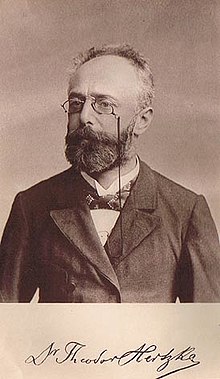Theodor Hertzka
Theodor Hertzka | |
|---|---|
 | |
| Born | July 13, 1845 |
| Died | October 22, 1924 (aged 79) |
| Nationality | Hungarian-Austrian |
| Academic career | |
| Field | Monetary theory |
| School or tradition | Freiwirtschaft |
Theodor Hertzka, or Hertzka Tivadar (July 13, 1845 – October 22, 1924) was a Jewish-Hungarian-Austrian economist and journalist.
Life[edit]
He studied at the universities of Vienna and Budapest, and in 1872 became a member of the editorial staff of the Neue Freie Presse of Vienna. In 1879 he founded the newspaper Wiener Allgemeine Zeitung, which he edited until 1886. He was a friend of Johannes Brahms.
Hertzka has been called the "Austrian Bellamy", because his novel Freiland, ein soziales Zukunftsbild[1] had a similar theme to that of Edward Bellamy's novel Looking Backward.
Though Hertzka was not a Zionist and his utopian vision was directed at human beings in general, Theodor Herzl acknowledged the influence of Hertzka on his own ideas in the opening chapter of his book Der Judenstaat, envisioning the creation of a Jewish state.
Bibliography[edit]
Other works by Hertzka are:
- Die Mängel des österreichischen Aktiengesetzentwurfs, Vienna, 1875;
- Das Wesen des Geldes, Leipzig, 1887
(in which he recommended the introduction of the gold standard in Austria); - Die Gesetze der Handelspolitik, ib. 1880;
- Das Personenporto: Ein Vorschlag zur Durchführung eines billigen Einheitstarifs im Personenverkehr der Eisenbahnen, Vienna, 1885;
- Die Gesetze der sozialen Entwickelung, Leipzig, 1886;
- Freiland – ein soziales Zukunftsbild Leipzig, 1890;
- Wechselkurs und Agio, Vienna, 1894
References[edit]
- ^ Freeland: A Social Anticipation. London: Chatto & Windus, 1891.
 This article incorporates text from a publication now in the public domain: Isidore Singer (1901–1906). "Theodor Hertzka". In Singer, Isidore; et al. (eds.). The Jewish Encyclopedia. New York: Funk & Wagnalls.
This article incorporates text from a publication now in the public domain: Isidore Singer (1901–1906). "Theodor Hertzka". In Singer, Isidore; et al. (eds.). The Jewish Encyclopedia. New York: Funk & Wagnalls.
Further reading[edit]
- Ransom, Arthur (1891). "A Competitive Utopia," The Gentleman's Magazine, Vol. CCLXXI, pp. 44–49.
External links[edit]
- Ulrich E Bach, “Seeking Emptiness: Theodor Hertzka’s Colonial Utopia Freiland (1890)” [1] In: Utopian Studies 22.1 (2011): 74-90.
- Works by Theodor Hertzka at Project Gutenberg
- Works by or about Theodor Hertzka at Internet Archive
